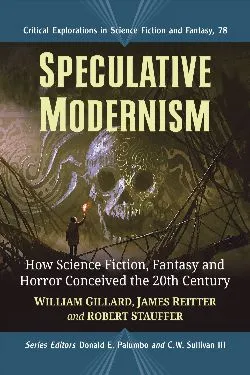
Speculative Modernism is a really interesting book that situates science fiction, fantasy, and horror in the larger trend of literary modernism. The book is a study of major speculative fiction stories between approximately 1880 and 1940, and it heavily leads into science fiction above other genres.
The book is broken into a number of thematic chapters that seek out overlaps between emergent speculative fiction and the modernists (e.g. T. S. Eliot, Gertrude Stein, Virginia Woolf, James Joyce, F. Scott Fitzgerald, Ezra Pound, Ernest Hemingway, and so on). The authors find that speculative fiction did indeed speak to the same issues as the modernists: what does it mean to live in the early 20th century? How doe we deal with the rapid transformations in technology and social relations? At what point must we break out of established customs and become our own, individual person?
The chapters cover the following themes:
- Utopia/Dystopia
- Shadows, the Other, Ghosts
- The Natural World, Ecology
- Colonialism and Race
- The Machine
- Mysticism and Religion
- Interiority and the Self, Individualism, Rationality
The specific works covered in this text are too numerous to be named, but they include everything from H. G. Wells’s The Time Machine to Tolkien’s “Leaf by Niggle,” Tarzan, Sherlock Holmes, Conrad’s Heart of Darkness, Buck Rogers, the works of H. P. Lovecraft, and more. Arthur Machen and Algernon Blackwood also receive plenty of space.
I had not previously read most of the works covered here, but the authors of this book did them justice: despite my own knowledge, the book was comprehensible and avoided meaningless academic jargon.
This probably shouldn’t be the first work to read on the history of speculative fiction/speculative fiction criticism. It might be more useful to read some sort of synthetic text to better place the arguments being made here. I don’t know the academic debates that this book is responding to, so I didn’t gain as much from it as I otherwise might have, but it was still a really interesting book.